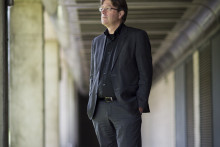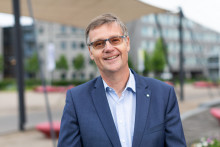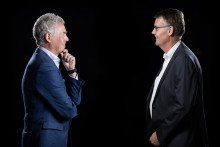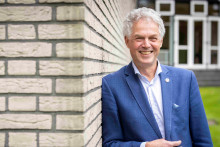How does it feel, approaching the end of your term?
‘Well, it certainly doesn’t feel very dramatic. This was the best job I’ve had up to now. At the same time, I’m a very inquisitive person and like to add another string to my bow every now and then. It’s customary to step down after two terms (eight years, ed.). I raised the issue with the Supervisory Board myself last year and told them I wanted to stick to that arrangement. What I really want to avoid is getting into a rut and doing things I’ve already done many times before.’
What are your plans?
‘As rector, you are entitled to a year’s sabbatical and that’s what I’m going to do. I’m looking forward to the prospect with great anticipation. You have a year to reorientate yourself. I mainly want to see whether and how I can reconnect with my field of scientific research, the applied mathematics of computer science. In addition, I will also regain control of my own schedule. And yes, that pleases me greatly. Mainly because I will have more time for spontaneous meetings and exchanging ideas. Because, apart from during the summer months when the campus is more peaceful, as rector, I didn’t have much time for that sort of thing.’
Can you be more specific?
‘Before I became rector, I already had a reasonably successful career. Most recently as scientific director of an institute at TU/e. What I want to guard against now is automatically falling into an administrator’s role. At the same time, I also realize that I cannot simply pick up the thread of my scientific career. I’m already looking into subjects to which I’d like to devote my time and I’m very enthusiastic about this. I’m also mulling over the idea of writing a book on my field of research and bringing out an essay compilation under the title ‘The university according to Brinksma’, with a collection of my speeches and presentations.’
There is also talk of you moving abroad?
‘That’s true, I’m spending part of my sabbatical year at the Singapore University of Technology and Design and the Stevens Institute of Technology in New York. Like ours, these universities are not very big but they do have a special, multidisciplinary mission and innovative educational concepts. I’m mainly going there to catch up on my field of expertise and to work on my books in between.’
You’ve held many different Executive Board positions at UT. Were you ever involved in disputes?
‘I’ve never been involved in a dispute at board level, although there have been some differences of opinion. Certainly at the beginning, I had a few exchanges with Anne Flierman (former Executive Board chairman, ed.) on the allocation of roles. But I’m going to have to disappoint the press and say that there were never any real disputes. The collective will to take on responsibility is really very strong.’
As board members, do you also have contact outside office hours?
‘Yes, sometimes you need to be in touch day and night. You get to know each other pretty well and sometimes that leads to more private dealings. Anne Flierman and I used to visit each other’s homes. Now, that level of contact has been diluted, because we’re both busy with our own jobs, of course.’

What has been disappointing over the past eight years?
‘Getting messages over to the university as a whole. I was sometimes exhausted from communicating. It felt like a challenge to keep communicating the same message in a clear way. And you had to do it again and again, and again and again… And there were still people in certain remote places who had never heard the message. I’ve also thought often enough that I had a good story, but then it turned out to be terribly complicated to get it across to people. In any case, I now know that, in some cases, only part of the message was received.’
You will also go down in UT history as the Twente Educational Model (TEM) rector. How do you feel about that?
‘Yes, I realize that. But the TEM is not yet finished, education is always developing. The world changes fast and, therefore, education constantly needs to adapt. A small but important part of quality is partly determined by your ability to change as a university. Moreover, people are increasingly recognizing the importance of education. Other universities are also taking this into consideration now. And we are ahead of them. I’m very proud of that. I’m increasingly seeing the positive effects of the TEM. Both within and outside the institution. Someone recently told me that even a delegate in Lithuania was informed about the TEM. They see in us an example from which they can learn. I also recently gave a presentation on our model to the Ministry of Education. It produced a lot of positive feedback and that gives me strength.’
In conclusion, will you stay connected with UT?
‘I would like to keep that option open. Answers often raise expectations and I want to avoid that. That’s also something I had to learn as rector. It is certainly true that the UT has a big place in my heart. This university has allowed me to develop into the person I have become. And wherever I end up, that will always play a role.’
During the Dies Natalis celebrations on Friday 25 November, Ed Brinksma will officially pass on the headship to his successor, Thom Palstra. Brinksma will also deliver the Dies Natalis speech, entitled ‘The empathic engineer’. On Friday 2 December there will be another leaving party for the then former rector.







